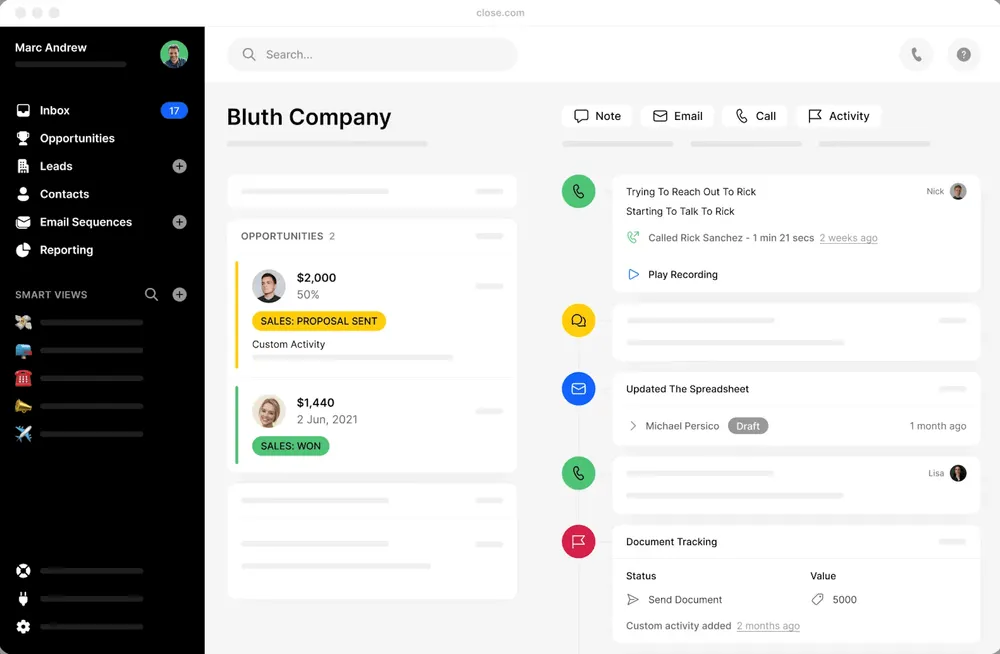
So, you’re in the early stages of growing your startup.
You want to emphasize increasing sales, but you’re not entirely sure what to focus on. You’re not sure which tools to use. You're worried that if you hire the wrong people or invest in the wrong strategies, nobody will buy your product, and your startup will crash and burn.
Sound familiar?
Startups are a minefield. And the worst part is, entrepreneurs don't have the budget to get it wrong.
I've been in your shoes. When I was 23, I booked a one-way ticket to California and landed a spot on YCombinator. I pitched twice to a well-known startup seed accelerator… and got rejected. It took another 10 years for Close to get some serious traction. And the company's entire success hinged on getting our sales process right.
Today, I'm going to share what I know. We’ll cover everything from what a solid sales process looks like, to the strategies and tools a startup needs to scale.
Let’s get started.
Seeking a fresh perspective on sales? Discover the power of the Challenger Sales Model.
What Is Startup Sales? 5 Aspects That Make Sales for Startups Unique
Ever been told that you need to learn to walk before you can run?
It’s kinda the same with sales.
Startup sales is where you cut your teeth and learn what you need to know. It's scrappy and a totally different ball game compared to general B2B and enterprise sales. Sales reps have to learn to juggle activities and close deals with limited resources and time. Not to mention the budget—startups aren't usually flush with cash.
So, startups require flexibility and creativity when starting out because everyone is learning on their feet. After all, a startup is a new business, so sales teams will be:
- Building a sales process. Unlike established companies, startups don’t have a pre-existing sales process and need to create one from scratch. This is time-consuming and requires a lot of trial and error, but it also means the team can build a process that reflects its unique needs and sales goals.
- Finding the right product-market fit. Startups might be running with an MVP to start with—the bare bones of its (hopefully) successful product or service. But to find a market for it, sales teams need to identify a target audience and get a really good idea of their needs, problems, and pain points. This requires a lot of research and time compared to an established B2B sales team that already has all this figured out.
- Dealing with rapid growth. And wearing a ton of different hats. One morning a sales rep might be dialing prospective leads and locking in demos, while the afternoon is spent finalizing sales playbooks. No two teams are the same, so startup sales teams must be agile and quickly adapt to changes.
- Selling with a limited team and few testimonials. Social proof is one of the best sales tools in a rep’s toolkit, but startups don't have the luxury of lots of testimonials or happy customers to make their case. Plus, the team will have fewer salespeople who are likely juggling multiple roles and don't have time to collect that social proof.
- Building relationships from scratch. Startups need to build strong relationships with their customers to establish trust and credibility. Building long-term relationships rather than short-term gains takes time and a strong focus on each customer in the pipeline.
What I'm saying: Startups have an uphill battle compared to established B2B sales teams because they need to do more with less.
All of these factors make sales arguably the most important element of any startup. In fact, Nick Persico, our Director of Sales & Marketing at Close, says sales should be the number one priority for startups as:
- It’s harder than ever to raise capital: Startups need cash. The best form of investment you can receive is through your customers. It’s what we did here at Close, and more than a decade later, our (once small) startup is growing without raising a single cent of capital.
- Sales helps you find your ideal customers quickly: The nitty-gritty of startups means talking to leads and finding the right customers for your business. This helps identify which customers get the most value from your products or services. You’ll quickly find a specific customer profile, build customer retention, and improve NPS scores—all of which can help you build an investment pitch if you decide to go that route.
- Sales brings clarity: When teams go out there, close deals, get customers, and (perhaps more importantly) lose customers, they gain clarity of purpose for the startup or small business.
But mastering sales is easier said than done, especially when there is so much to learn.
Startup Sales Glossary: Terms You Should Know
The first couple of months at a startup can feel like you’re going back to school.
There are many things to learn, especially terms and acronyms that are key to the startup sales process. We have an entire dictionary of sales terms here, but the fundamental terms you must get comfortable with include:
- Leads: Potential customers who have shown some level of interest in your product or service.
- Prospects: Leads who have been further qualified and identified as potential customers.
- Qualification: Identifying whether a prospective customer has the budget, authority, need, and willingness to buy your product/service.
- MQL & SQL: MQL stands for Marketing Qualified Leads, while SQL stands for Sales Qualified Leads. MQLs are worth focusing on for your marketing team, while SQLs can be passed over to the sales team—they’re ready for direct outreach.
- Runway: The amount of time a startup has until it runs out of money (which is super important to watch, especially in the first year.)
- Sales funnel: A visual representation of the sales process—it illustrates which touchpoints are involved, from lead generation to paying customers.
- Pipeline: A chart or board (usually Gantt or Kanban) of all the deals your team is currently working on and their stage in the sales process.
Learn these first, then pick up the rest of the sales vocab as you go.
Okay—enough schooling. Let's discuss what a startup sales process looks like.
Setting up a Startup Sales Process That Helps You Grow
If you’re going to grow consistently, it’s essential to have a structured process that your sales team (and future hires) can follow. Here are seven steps to get you from having no sales process to a complete, structured path from start to finish.
1. Clearly Identify Who You’re Selling to
The first step in any sales process is to find your target market—the people who will actually pay for your product.
When I started hunting for Close's first few paying customers, I went to CrunchBase and found around a hundred companies I knew had money and could benefit from the product. Then, I picked up the phone and asked them outright if they were willing to pre-pay for an on-demand outsourced sales team.
I also didn't want anyone to feel like they were being taken advantage of, so startups could ask for their money back at any time. This helped us win trust and find out who our real target market was—right at the start of the process.
Knowing our target market and who the decision-makers were in that market allowed me to tailor the sales pitch to their needs and provide the information they needed to make a purchasing decision.
2. Decide Whether You’ll Do Inbound or Outbound (or Both)
Next, pick which sales strategy you will use to reach customers.
Incorporating outbound sales tools can play a critical role in shaping the effectiveness of your chosen strategy.
I suggest picking between an inbound and outbound sales approach. Inbound sales will bring in leads and prospects using content marketing, social media marketing, and SEO. This is a long-term strategy that won’t give you many immediate results. Outbound sales relies on cold calling, email marketing, and direct mail to (hopefully) achieve the same result, but in the shorter term. However, it doesn’t have the accumulative power that inbound does.
We have a 100 percent inbound sales process here at Close—a lot of that comes down to our content machine that brings in a ton of high-quality leads every month. This strategy was a decade in the making, and at the start, we used outbound sales to reach out to leads that fit our ICP quickly.
Eventually, as our content picked up, we scaled this back and relied on inbound to bring home the bacon.
The key here is to play to your strengths. There's no right or wrong path to take—it depends on who your customers are and what kind of buying experience they expect.
3. Build a Lead Generation Process That Delivers High-quality Leads
Now, build out a rock-solid lead generation process that will net high-quality prospects.
This process should include a mix of online and offline efforts that can get you closer to your audience—anything from content marketing to emails and calls to good old-fashioned event networking. The lead generation machine you build is arguably as important as your product—it's how your company will grow and scale over time.
Early on at Close, I relied heavily on my sales knowledge to go out and pitch in person. I put the normal stuff startup founders are expected to do on hold and spent time giving speeches at conferences, recording video content for the YouTube channel, and doing podcast interviews. This helped lay a strong foundation for our content and give our brand some authority. The gamble paid off. Big.
Seeking to optimize your content marketing? Explore AI's potential in our article.
4. Set up Clear Criteria to Qualify New Leads
This is a big one.
Not all leads are created equal. Startups should figure out as early as possible who is a good-fit customer—and who’s not. You must define clear criteria to qualify new leads so that you can focus your efforts on those that are most likely to convert.
Tell your sales reps which boxes need to be ticked when qualifying leads, like budget, decision-making authority, and buying timeline.
This process is a long one, so check out this other post about how team members should qualify new leads.
5. Write a Compelling Sales Pitch You Can Adapt and Personalize
Your sales pitch is key to a customer's first impression of your product.
It should be compelling, informative, and personalized. But, it should also be general enough that sales reps don't need to spend hours tweaking it each time they reach out to a prospect.
Here's where sales playbooks can help keep everything uniform and consistent. It doesn't mean squashing your sales rep's creativity when they connect with clients—it just sets some ground rules about what offers they can pitch and what features they should highlight when talking to prospects. That kind of thing.
Your sales playbook should include two scripts: an "elevator pitch" and a more detailed sales pitch for qualified leads.
- The Elevator Pitch: An elevator pitch is a sales pitch that can be delivered in an elevator ride. It should include enough information to make your product memorable without turning into a ramble. Use this to hook new leads.
- The Detailed Pitch: If a lead has already been qualified and fits your ICP, your sales playbook can tell reps to roll out the more detailed pitch. This pitch should be personalized, address their pain points, offer your product as a solution, and discuss next steps.
If you can capture a prospect’s attention and point them to a feature in your product that solves a problem, that’s a major improvement over an average cold sales pitch. Check out my step-by-step guide on how to craft the perfect sales pitch to really nail this step.
6. Create a Regular Follow-up Frequency
Following up with leads is key to closing deals.
You need to create a regular follow-up cadence to ensure that you stay top-of-mind with prospects, whether it's a phone call, email, or anything else. At this stage in the process, the right tools are worth their weight in gold. And here’s some advice: Let email automation become your new best friend.
You don’t need to whip up a fresh email every single time a new trial signup comes through your website or an online form. You don’t need to hire a dozen salespeople to do this, either.
This is the entire reason I created Close—to make this part of the sales process easier. Our email automation tools help you create templates and sequences that do the heavy lifting for you. Just draft the emails you want to send, create the sequences, and use the hundreds of hours you’ll save to keep growing the business and fine-tuning your follow-ups.
 |
7. Have a Structured Post-sale Process
Finally, you need to have a structured post-sale process in place to meet customer expectations.
This should include follow-up emails, customer satisfaction surveys, and upselling and cross-selling opportunities. Basically, put a process in place to make sure that customers are—and remain—happy.
If they are, use this step to ask for feedback and referrals to help your sales and marketing team win over more customers. If they're not, use their constructive criticism to improve your sales process or product features.
It's not rocket science. Listen to your customers, give them what they want, and use their feedback to help you grow the business.
6 Best Practices for a Winning Startup Sales Strategy
Startups are tricky. And growing them is a whole different challenge.
To create a winning startup sales strategy, you need repeatable processes in place so your team can handle the ride when the company starts to scale.
I've been there—so, here is my top advice for every startup sales team.
1. Talk to New Trial Signups and Customers—a Lot
Talk to your customers and ask questions.
I know what you're thinking: “Wow. Great advice Steli. Really eye-opening stuff here.”
Well, a lot of startups don't listen to their customers. They just tell them what they want to hear and build features they probably don't need.
But, if you talk to new trial sign-ups and paying customers, they will tell you what they need. Strike while the iron’s hot. After they sign up for a trial, reach out. After they perform a certain task or action, reach out again. The key is to keep every potential customer engaged and using your product throughout their trial.
Then, monitor their actions and connect the dots to solve the pain points that originally drove them to your product. Your goal is to help them see the value in your product ASAP. If their trial expires before they even figure out how to use the features they wanted in the first place, good luck closing that deal.
2. Build a Repeatable Process Before You Make Your First Sales Hire
Before you hire your first sales rep, you need to develop a repeatable sales process.
This process should be well-documented and tested to ensure that it's effective. It's essential to have this strategy in place so new sales reps can be onboarded quickly and efficiently. Your repeatable sales process should include:
- Lead generation tactics
- Lead qualification criteria
- Presentation and demo format
- Customer communication and follow-up procedures
- Key performance indicators (KPIs) to measure customer success
Oh, and don't forget to include information about when sales reps should think about upselling and cross-selling. For example, if you’re selling a SaaS product, a cross-sell on training or consulting services that go hand-in-hand with the software is an easy sell and can help your customer base get more value from your product.
Talk about a win-win.
Hey, have you heard about our comprehensive guide to MQL vs. SQL? It's a game-changer.
3. Develop Your USP Early
Before you can sell anything, you need to know what makes your product or service unique.
Your unique selling proposition (USP) will help your product stand out and give sales reps a clear north star to focus on when talking with prospects. Your USP should resonate with your target audience and pique their interest. Think about your product in terms of:
- Quality: Do you offer a higher quality product/service than your competition?
- Price: Is your product/service more affordable than your competition?
- Features: Do you offer unique/more features than your competition?
- Convenience: Is it easier to use/more convenient than your competition?
You don't have to crush your competitor in every area—just pick one and focus on it.
I've always been a fan of Slack's USP: "From Fortune 100 companies to corner markets, millions of people around the world use Slack to connect their teams, unify their systems, and drive their business forward."
 |
The communication tool space is really saturated, but Slack pitches its product as unique by pitching it as a way for different people and departments in a business to communicate. And that's an extremely valuable proposition for any business.
Slack's fast growth proves it: A USP can mean everything.
4. Find Underrated Sales Talent
Let’s be real here—if your startup is still in the early stages, you most likely don’t have the funds to hire a massive sales team of full-time heavy hitters. You need to hire the appropriate talent for your startup.
Does that mean you’re destined for months (or years) of mediocrity and poor sales numbers?
Not at all.
Some of the best (yet underrated) salespeople come from non-sales backgrounds. And proven heavy hitters weren't always as good (and expensive) at their first sales jobs as they are today. They started their careers as hustlers with potential. And the companies that hired those hidden talents in their early days were able to bring in top salespeople without paying top dollar.
Let’s take a look at this through a sports lens.
In the NBA, superstars like LeBron James, Kawhi Leonard, and Steph Curry are all making $40 million a year—and for good reason. They bring their cities championships and endorsement deals and massively increase the value of their teams.
But this wasn't always the case. They all started their careers as rookies with potential. And the teams that drafted them ended up getting All-Star production without having to pay for All-Star contracts. And if a team drafts well multiple years in a row, all of a sudden, they've created a team with multiple All-Stars capable of winning titles.
The perfect example?
The Golden State Warriors. They drafted Steph Curry, Klay Thompson, and Draymond Green and won the 2015 NBA title while paying all three a total of $40 million.
So what’s the takeaway here for sales leaders?
If you can find under-the-radar hustlers, you can build your own superstar sales team from the ground up—Golden State Warriors-style.
5. Track the Sales Metrics That Matter (Hint: It's Not ALL of Them)
Tracking the right sales metrics is essential for any startup because it helps you see where things are going well—and spot any problems in your sales process.
However, one of the biggest traps founders fall into is thinking they need to track every single metric and KPI. You don’t. Just focus on the metrics that matter most to a startup's bottom line and customer retention, like:
- Conversion rate
- Sales cycle length
- Customer acquisition cost (CAC)
- Customer lifetime value (CLV)
- Monthly recurring revenue (MRR)
- Sales pipeline velocity/value
Again, keep it simple and use a tool to track all of this. Close can monitor SDR activity, and track sales velocity and conversion rates while keeping an eye on pipeline opportunities in real-time.
 |
Founders can see how variables like industry, lead source, or job title affect the probability of closing a deal, and what types of leads the sales team should focus on to grow revenue.
6. Keep Sales Processes Simple and Automate Where You Can
Finally, keep your sales processes simple and palm off the manual tasks wherever possible so your team can focus on selling.
I'm biased, but I really believe investing in a customer relationship management (CRM) system can be a game-changer for startups. It's a single source of truth to track leads and customers, automate repetitive tasks, and store important data. Using a CRM like Close also means you can automate email outreach, follow up with leads, and book demos all via one platform.
And this is just one way to automate your sales process.
Let's take a better look at why I think tools can be the key to a startup's sales success.
5 Tech Tools Your Startup Sales Team Needs
Even for startups, the average tech stack will include several tools to help sales representatives sell more.
In fact, a survey by LinkedIn found 73 percent of salespeople use technology to help close more deals, and 97 percent of salespeople said tools are either "important" or "very important" to their sales process. Today, the average high-growth sales organization has around five tools in its tech stack and uses them to help with prospecting, automated outreach, analytics tracking, and more.
When I launched Close, I found all of the options for sales tools to be overwhelming. With a tight budget, it's hard to know what you actually need versus what's a luxury.
Here are five types of tools that I guarantee will help speed up your sales process.
1. A Startup-Focused CRM
Your CRM software is the heartbeat of your sales team. It's where relationships are nurtured, and data is analyzed. It's also where sales processes are deployed, prospect conversations are recorded, calls are tracked, forecasts are made, and sales pipelines are built.
This tool is essentially the hub of any startup, and frankly, I don't know how any company survives without one.
And the best startup-focused CRM? Close.
 |
Close packs everything from lead management to calling automation to powerful reporting—all in one platform. It’s easy to learn and onboarding new customers is fast and painless. Close can be customized to any sales process, and it integrates with many other tech tools. Close is the perfect CRM for growing, agile sales teams—sign up for your 14-day free trial, and close more deals right away.
2. Lead Generation + Prospecting Tools
As a sales team, identifying potential customers is the first step toward increasing sales. But converting them into paying customers is easier said than done.
Lead generation and prospecting tools can help sales teams find new leads and prospects more efficiently based on criteria such as industry, location, company size, and revenue. If you use a CRM, these leads can be fed back into the database—making follow-up efficient, and ensuring that opportunities don’t fall through the cracks.
Here are the best lead generation and prospecting tools:
- LinkedIn Sales Navigator: Connect with prospects that fit your ICP and use advanced search filters to speed up your search.
- Crunchbase: Access a huge database packed with company information, funding details, and industry trends to search for potential leads.
- LeadFeeder: Get insight into website visitors, track behavior, and find potential leads. It’s a quick way to find, prioritize, and engage with the most qualified prospects.
Want to know the secret to lead generation success? It's LinkedIn.
3. Documentation Software
Documentation software helps startup sales teams keep content like sales scripts, decks, whitepapers, and contracts in one place.
A little boring? Yeah. Essential? 100 percent.
The best documentation software tools are:
- BetterProposals: An awesome tool for any startup to create professional sales proposals that increase conversion rates.
- PandaDoc: Send, track, and e-sign proposals and contracts to speed up deal closures.
- HelloSign: Send contracts and get legally-binding electronic signatures instantly. Less paperwork, fewer delayed contracts.
4. Startup Sales Automation + Productivity Tools
These tools have one job: to make your day-to-day sales life easier.
Use them to automate your outreach efforts and improve the ROI of every email campaign. Invest in a tool that can create personalized email templates, schedule follow-up emails, and track email opens and responses—these are features that will help your team save time.
Oh, and don't snooze on scheduling software. It can automatically schedule meetings and calls with potential customers to avoid double bookings and send follow-up reminders.
Here are some of the best sales automation and productivity tools:
- SavvyCal: Send prospects personalized booking links and cut out the back-and-forth emails. Close integrates with SavvyCal.
- Calendly: Let prospects book meetings based on your availability. Just sync your calendar and create custom appointments for new leads or prospects further along in the funnel. Close also integrates with Calendly.
- Zapier: Automate repetitive tasks and connect different apps in your sales tech stack to save time. And yep. Close integrates with Zapier.
- Process Street: Create standardized workflows and build consistency across every part of your sales process. (We also integrate with Process Street.)
5. Analytics Tools
Finally, as your company grows, analytics tools can spot key trends and areas for improvement. This will help you tighten up every part of your sales process.
The best analytics tools are:
- Tableau: Visualize prospect data with interactive, real-time dashboards and reports.
- Mixpanel: Track prospect behavior and engagement to get insight into what product or service they will benefit from the most.
Equip your startup sales team with the right tools. These will help them do their best work, build strong relationships with customers, and, most importantly—grow your bottom line.
Launch Your Startup Toward Successful Sales Growth
If you’re an early-stage startup, remember: You don’t need to invest hundreds of thousands of dollars into top-level, superstar salespeople. Or buy a bunch of different tools. Or religiously follow a single methodology. Or spend months learning every word of sales vocabulary.
Focus on the stuff that will actually move the needle. Get your processes right. Build a watertight strategy. Automate where you can. And most importantly—talk to your customers and meet them where they are.
Oh, and make sure your team has the right tools that secure their current and future success. Start your 14-day free trial of Close CRM today (no strings attached, no credit card required.)










